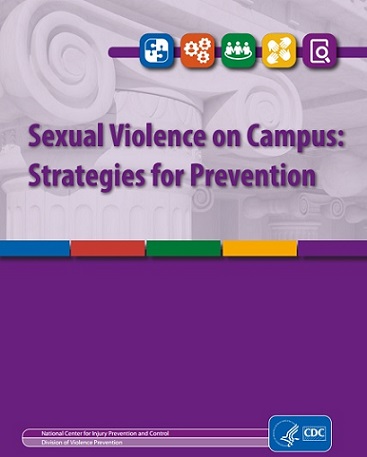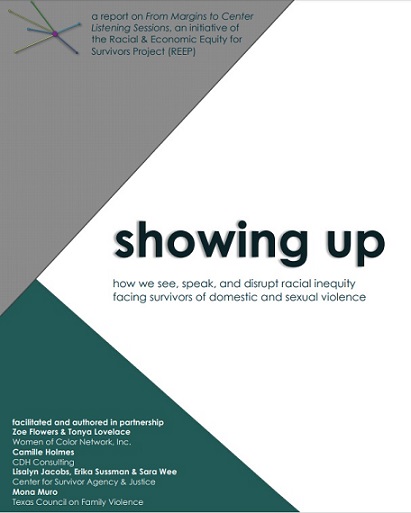Resources Library: Population-Specific Response
Start a Search:
Sexual Violence on Campus: Strategies for Prevention

The Centers of Disease Control and Prevention recently released Sexual Violence on Campus: Strategies for Prevention. This tool offers an overview of how to approach sexual violence prevention on college campuses with real-world examples from the field.
Click here to access the document.
Showing Up: How We See, Speak, and Disrupt Racial Inequity Facing Survivors

(as originally posted by the Center for Survivor Agency & Justice)
In September 2017, REEP facilitated seven From Margins to Center Listening Sessions to facilitate dialogue across the field on racial and economic equity for survivors. This report dialogues-back with the community that contributed to the From Margins to Center Listening Sessions. It shares themes and issues from Listening Session conversations via text, graphics and illustrations in order to aid in self-reflection, challenge dominant narratives, support improved data collection and analysis, and to begin, continue, or advance conversations and work toward racial equity for domestic and sexual violence survivors and for all of us.
State Policy Playbook for Ending Campus Sexual Assault
Know Your IX's State Policy Playbook outlines key reforms that students, advocates, and state policymakers can pursue to support survivors on campus, keep students safe, and end gender-based violence in school. Although Title IX and the Clery Act require schools to take action to address gender-based violence, these federal laws set only a floor for schools' responsibilities to create safe and equitable learning environments. States can and should do more to keep schools from sweeping sexual violence under the rug.
For additional resources, you can visit the Know your IX website here.
Supporting Multilingual and Bicultural Rural Advocates
Rural dual/multi-service advocacy programs that are able to provide culturally and linguistically appropriate services to sexual violence survivors make services for all rural survivors more inclusive and accessible. Multilingual and bicultural advocates are an important part of rural agencies being able to provide these culturally and linguistically appropriate services. A multilingual advocate is someone who can understand and speak more than one language. Often, multilingual advocates are bicultural as well. A bicultural advocate is someone who balances the cultural attitudes and customs of two countries or ethnic groups, usually someone who has moved to the United States from another country or someone whose parents moved to the United States from another country. Advocacy programs often struggle to find, hire, and retain multilingual and bicultural rural advocates. This is why it is important to understand who these advocates are, where they come from, and how we can create a supportive work environment for them. This paper is intended for rural dual/multi-service agencies looking for suggestions on how they can support multilingual and bicultural rural advocates.
Supporting Survivors of Abuse with Disabilities
Here are five modules designed for domestic violence and sexual assault service providers to learn how they can enhance their services for people with disabilities. CEU's are available.
These modules were created by the I-CAN! Accessibility Project. The I-CAN! Accessibility Project is a collaboration between the Virginia Commonwealth University School of Social Work and the Partnership for People with Disabilities.
Visit https://sites.google.com/vcu.edu/abusesurvivorswithdisabilities/home to access these resources.

